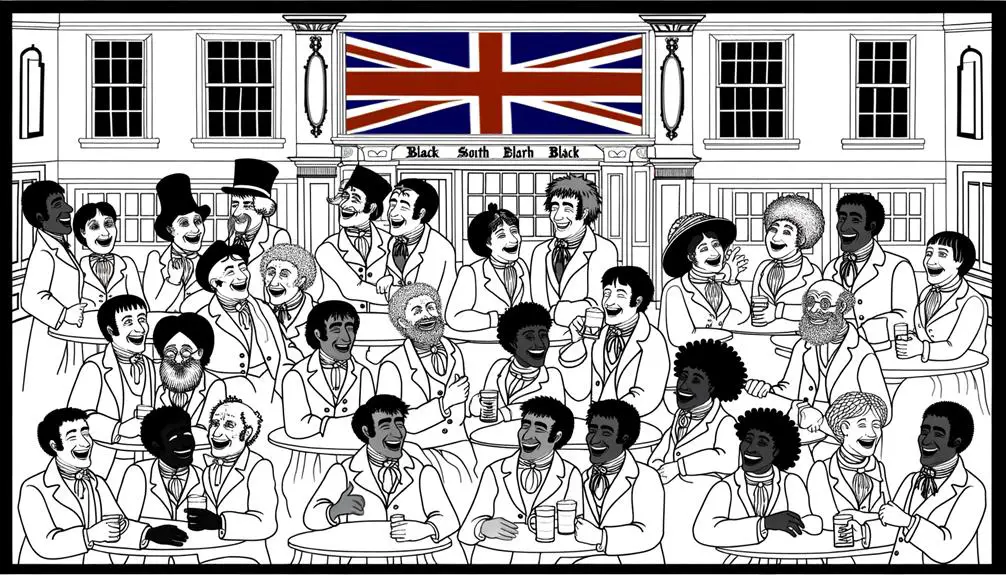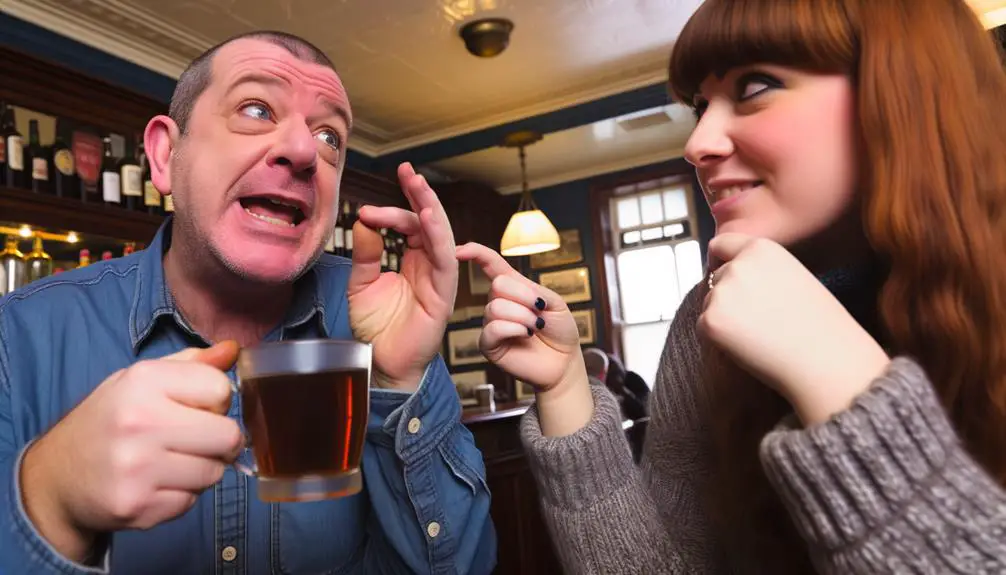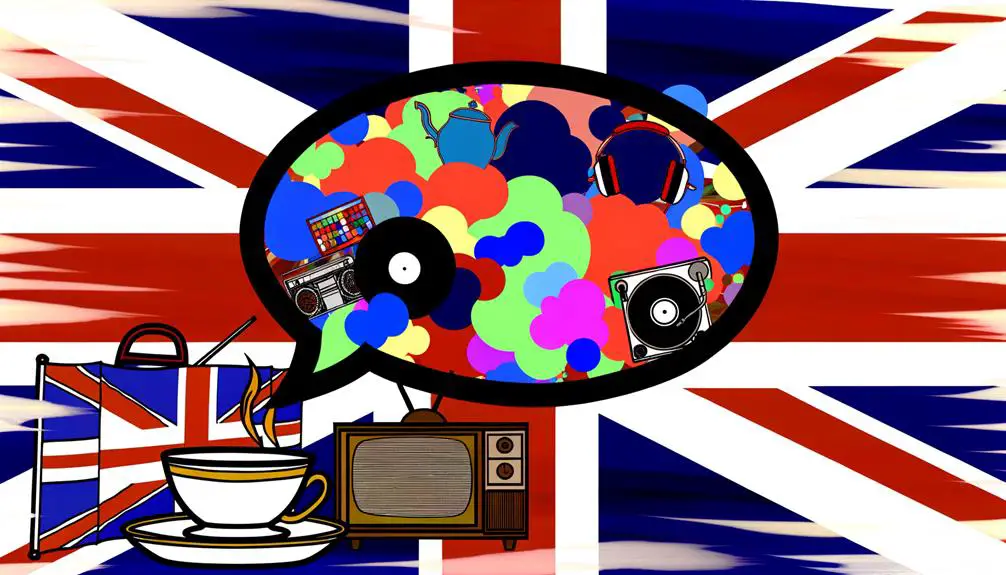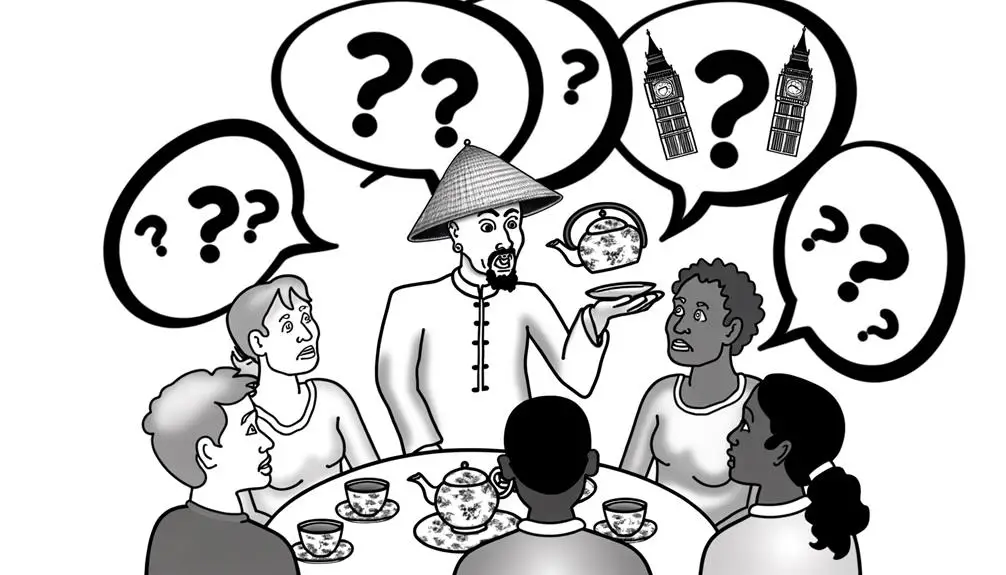In British slang, 'crack on' means to proceed or continue with something energetically or enthusiastically. It's a phrase rooted in early 20th-century English, signaling determination, perseverance, and an enthusiasm to advance. The context determines its precise application, from starting on tasks with gusto to advancing romantic interests. Across the UK, variations in usage highlight regional dialects, enriching British colloquialism. Whether engaging in banter, signaling romantic interest, or expressing determination in daily endeavors, understanding 'crack on' elevates your grasp of British slang. As you explore further, you'll uncover the nuance and versatility of this enduring phrase.
Key Takeaways
- "Crack on" in British slang means to proceed or continue with something with enthusiasm or vigor.
- It reflects a spirit of determination, often used to encourage someone to start or persist in their efforts.
- The phrase is versatile, adapting its meaning based on the context of the conversation.
- In romantic contexts, "crack on" can signify making a move or advancing a relationship.
- Its usage is informal, commonly found in everyday conversations, and varies regionally across the UK.
Origins of "Crack On"

Delving into the origins of 'Crack On', it's evident this phrase has deep roots in British slang, embodying a sense of determination and perseverance. Your etymology exploration reveals that 'crack on' likely originated from early 20th-century British English, initially capturing the essence of commencing or continuing an action with enthusiasm. However, it's not just a matter of historical emergence; regional variations play a significant role in understanding its nuanced origins.
In some parts of Britain, 'crack' has long been linked with conversation or news, as in 'What's the gossip?' This suggests that 'crack on' might also have developed from the notion of proceeding with a narrative or action. It's intriguing to note how regional dialects shape the phrase's adoption and adaptation, offering a more intricate, detailed understanding of its use.
Your investigation into the phrase's background underscores the importance of context. In regions steeped in industrial heritage, 'crack on' might evoke images of hard work and resilience, whereas in more urban areas, it could lean towards progressing with one's plans or ambitions. This etymological and regional exploration provides a thorough view, highlighting how 'crack on' encapsulates a blend of historical depth and geographical diversity within British slang.
Common Meanings Explained
Building on our exploration of 'crack on's origins, let's now examine its common meanings and how they manifest in everyday British vernacular. In the rich tapestry of British slang, 'crack on' is a versatile phrase, shaped substantially by both slang evolution and regional variations. At its core, 'crack on' conveys a sense of perseverance or to continue with a task with renewed vigor. It's a call to action, urging someone to proceed or to carry on with their endeavors, often regardless of previous setbacks.
Delving deeper, you'll find that 'crack on' can also imply the initiation of something, particularly in social contexts. This usage reflects the dynamic nature of slang, where meanings expand and adapt to fit contemporary social landscapes. Regional variations play a critical role here, subtly altering its connotation based on geographical location within the UK. For instance, in some areas, 'crack on' might lean more towards starting a task with enthusiasm, while in others, it could emphasize the aspect of continuing despite difficulties.
Understanding 'crack on' in all its complexity requires an appreciation for the fluidity of language and the cultural nuances that inform its use. As slang evolves, so too does the fabric of the expressions it encompasses, making 'crack on' a fascinating study of linguistic resilience and adaptability.
Usage in Daily Conversations

You'll find that 'crack on' weaves into daily conversations with remarkable fluidity, adapting its meaning based on the context it's used in. Understanding common expressions and their interpretations is essential for grasping the nuance behind this versatile phrase. This exploration sheds light on how it enriches dialogues, providing a deeper insight into British colloquialism.
Common Expressions Explained
In British slang, 'crack on' is a versatile expression commonly used to spur someone on to continue or to start something with enthusiasm and without delay. Its usage reflects the rich tapestry of British culture, showcasing regional variations and the fascinating evolution of slang. This expression serves various functions in daily conversations, illustrating its adaptability and enduring popularity across different contexts.
- Encouragement and Motivation: 'You're doing a great job with your project, just crack on!'
- Initiating Action: 'We haven't got all day. Let's crack on with the meeting.'
- Continuation of Effort: 'Despite the setbacks, it's important to crack on and not lose momentum.'
Analyzing 'crack on' reveals its significance in conveying enthusiasm and determination, making it a quintessential element of British colloquial speech.
Interpretation in Context
Understanding the phrase 'crack on' requires examining how it's woven into the fabric of daily conversations among Brits. This term embodies cultural nuances that highlight the British penchant for perseverance and getting things done. When you're told to "crack on" in a social setting, it's not just an encouragement to continue what you're doing; it's an endorsement of your approach and a subtle nod to your initiative. Slang evolution plays a significant role in how 'crack on' is used and understood. Its meaning can shift subtly depending on the context—whether it's pushing through work or pursuing a romantic interest. This versatility makes 'crack on' a quintessential example of how British slang adapts to the contours of everyday life, encapsulating complex ideas in simple, relatable terms.
"Crack On" in Romantic Contexts
When you're maneuvering the intricate dynamics of British dating, understanding how to 'crack on' becomes essential. This phrase encapsulates the journey from signaling your romantic interest to someone, through the nuanced ways affection is shown, to the strategic steps taken to advance the relationship. Each stage demands a keen awareness of social cues and the ability to act with both confidence and sensitivity.
Pursuing Romantic Interest
You'll find that 'crack on' takes on a nuanced, flirtatious tone when applied to the pursuit of romantic interest, embodying both the boldness and subtlety of initiating courtship. This phrase is deeply embedded within the fabric of British dating etiquette, serving as a verbal cue that one is ready to advance their romantic endeavors.
- Observing attraction signals keenly, to gauge if the interest is mutual before making a move.
- Employing 'crack on' in conversation indicates a readiness to escalate the relationship beyond friendship, with a layer of charm.
- The approach respects the delicate balance between showing interest and maintaining the dignity of both parties involved, adhering to the unwritten rules of modern dating.
Through these actions, 'crack on' becomes a strategic play in the intricate game of love, highlighting one's intentions without overt pressure.
Signals of Affection
To successfully crack on in romantic contexts, it's essential to recognize and interpret the signals of affection that indicate mutual interest. Understanding these signals, often subtle blends of friendship signals and social cues, can be the difference between progressing a relationship or misreading the situation entirely.
| Signal | Friendship or Romantic | Key Indicator |
|---|---|---|
| Frequent Texting | Both | Content and time of day |
| Physical Touch | Romantic | Context and comfort |
| Personal Space | Both | Distance and duration |
| Sharing Personal Stories | Both | Depth and frequency |
Analyzing these cues requires a keen eye for detail and an understanding of the dynamics at play. It's not just about what's said or done, but how it's conveyed.
Relationship Advancement Steps
Advancing a relationship requires understanding the nuanced steps to make progress effectively, ensuring mutual interest and compatibility are at the forefront. In today's digital age, maneuvering through the maze of dating apps and overcoming communication barriers play a pivotal role in relationship progression. Here's a breakdown:
- Exploring Dating Apps: Mastering the art of presenting oneself authentically and engaging in meaningful conversations can greatly enhance chances of success.
- Overcoming Communication Obstacles: Developing an understanding of non-verbal cues and expressing oneself clearly can bridge gaps in digital and face-to-face interactions.
- Mutual Interest Evaluations: Regularly evaluating mutual interest and ensuring compatibility through shared activities and open discussions aids in deepening the connection.
Adopting these steps with a blend of patience and persistence can streamline the journey from casual dating to a committed relationship.
Differences Across the UK
The term 'crack' exhibits a fascinating range of meanings across the UK, each nuanced interpretation shaped by regional dialects and cultural contexts. You'll find that in some areas, 'crack on' straightforwardly means to continue or proceed, especially with a task. However, explore into different corners of the UK, and you'll uncover layers of cultural variations that enrich the phrase with local color and texture.
In Northern England, for instance, 'crack' carries the additional connotation of conversation or news, stemming from the Old Norse word 'kraka,' meaning to gossip or chat. This linguistic heritage reflects the region's historical connections and influences. When someone says they're going to 'crack on,' it might also imply they're ready to engage in some lively banter or catch up on news.
Contrast this with usage in other parts of the UK, where 'crack on' might lean more heavily towards the sense of making a move in a romantic context or simply getting on with work with a sense of urgency. These regional dialects and the cultural variations they encapsulate highlight the rich tapestry of language across the UK, demonstrating how a simple phrase like 'crack on' can hold a kaleidoscope of meanings, colored by the area's unique linguistic landscape.
Popular Culture References

In exploring the world of popular culture, you'll find that 'crack on' not only permeates daily conversation but also shapes narratives in television, music, and film across the UK. This phrase, deeply embedded in British slang, has transcended its colloquial roots to become a staple in various forms of media, often used to express determination, resilience, or the start of a pursuit in a lighthearted manner. Through celebrity quotes in interviews and strategically placed music lyrics, 'crack on' has been elevated from street slang to a cultural marker, symbolizing a quintessentially British blend of humor and stoicism.
To paint a picture for you:
- Television Shows: Reality TV series and British sitcoms frequently feature characters using 'crack on' to signify moving forward with a task or relationship, hence normalizing the phrase within everyday language.
- Music Lyrics: UK artists often incorporate 'crack on' into their lyrics to resonate with a local audience, embedding the phrase into the collective memory through catchy hooks and relatable narratives.
- Celebrity Quotes: Interviews with British celebrities reveal 'crack on' as a go-to expression of perseverance and ambition, further amplifying its usage and acceptance in wider society.
Analyzing these references provides insight into how 'crack on' has woven itself into the fabric of British pop culture, illustrating the dynamic interplay between language and media.
How to Use "Crack On" Appropriately
Having explored its impact on popular culture, let's now consider how you can master using 'crack on' in everyday British English, ensuring your usage is both authentic and appropriate. The key to utilizing 'crack on' lies in understanding the context and the subtleties of the phrase. Primarily, it signifies continuing or proceeding with something, particularly after a pause or interruption. It's essential to recognize when it's suitable to inject this phrase into conversation. Typically, it's used in informal settings among friends or colleagues, offering a sense of encouragement or motivation.
To sound genuinely British, it's beneficial to be aware of phrase variations and regional synonyms. For instance, in some areas, 'get on with it' can serve a similar purpose but with a slightly more imperative tone. Depending on the region, you might also encounter unique expressions that carry a similar meaning to 'crack on,' enriching your vocabulary with local flavor. By paying attention to these regional nuances, you can adjust your usage to fit the context more naturally, enhancing both your understanding and your authenticity when engaging in conversations within different parts of the UK.
Misunderstandings to Avoid

Why is it important to avoid misunderstandings when using 'crack on' in British slang? In the rich tapestry of British colloquialisms, 'crack on' is a phrase that exemplifies the complexity of regional dialects and cultural nuances. Misinterpretations can lead to confusion, embarrassment, or even offense, making precision and awareness vital. Here's why understanding the context and connotations of 'crack on' matters:
- Cultural Sensitivity: Recognizing the cultural context in which 'crack on' is used guarantees respectful communication. British slang varies widely across regions, and what's considered casual or humorous in one area might be perceived differently in another.
- Clarity of Intent: The phrase can imply a range of actions, from continuing diligently with a task to making romantic advances. Misunderstanding the intended meaning can lead to awkward situations or miscommunications.
- Navigating Regional Dialects: The UK's diverse linguistic landscape means that slang terms, including 'crack on,' can have slightly different nuances or uses depending on the region. Being informed about these variations helps in avoiding potential faux pas and enhances the effectiveness of communication.
Understanding the subtleties of 'crack on' within the framework of British slang is not just about linguistic accuracy; it's about fostering clearer, more considerate interactions.







